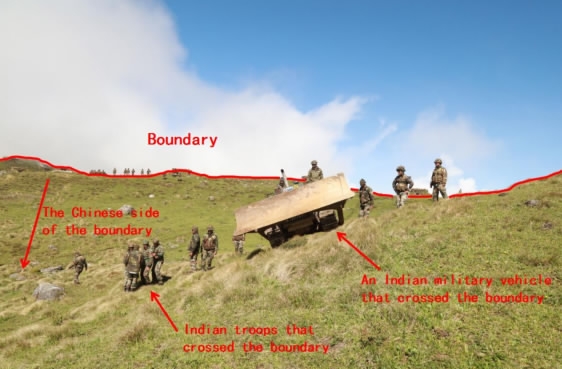
Politics
16:30, 12-Aug-2017
Are China and India on the edge of war?
By Meng Yaping

The China-India standoff in Donglang area has been ongoing for almost two months now, with little sign of an end in sight. As the world pays close attention to the impasse and how it will develop, an expert told CGTN that it is highly unlikely that a war would break out between China and India at this moment.
"Both countries have made no preparations for war and the disagreement on Donglang area is not major enough for both sides to resort to violence as a solution," said a military expert on Sino-Indian relations from a university affiliated with the Chinese People's Liberation Army (PLA) on condition of anonymity.
The expert went on to explain that both sides want a peaceful end to the dispute, but the only solution is for India to withdraw its troops who have trespassed into the Chinese territory.

Indian troops trespassed into Chinese territory on June 18. /MOFA Photo
Indian troops trespassed into Chinese territory on June 18. /MOFA Photo
"For India, the problem is how to find an appropriate time and excuse for the pullback. So far New Delhi has not made major changes to its stance, so no progress has been achieved to peacefully resolve the dispute," he said.
The dispute arose in mid-June when Indian border troops illegally crossed the border into territory under Chinese sovereignty and obstructed road construction work in Donglang, which is indisputably Chinese territory according to the Convention Between Great Britain and China Relating to Sikkim and Tibet signed in 1890.

A sketch map of the site of the current standoff between China and India. /MOFA Photo
A sketch map of the site of the current standoff between China and India. /MOFA Photo
Why doesn't China want a war?
China pursues a national defense policy that is purely defensive in nature and undertakes a path of peaceful development, said the expert.
"China does not want war and has shown peaceful gestures to India."
Since the incident occurred, China has shown utmost goodwill and great restraint and sought to communicate with India through diplomatic channels to resolve the incident, according to a statement released by the Chinese Ministry of Foreign Affairs on August 2.
The ministry has repeatedly stressed China's stance that the prerequisite and basis for resolving the deadlock is that India immediately and unconditionally withdraws its trespassing border troops back to the Indian side of the boundary.

What about India?
India as well is not looking for war, considering the pressure it faces from international public opinions, its intense domestic situation and disputes with other neighboring countries, the expert explained.
The crossing of the already delimited boundary by the Indian troops violates China’s sovereignty and territorial integrity, contravenes the 1890 Convention and the UN Charter, and tramples grossly on the basic principles of international law and basic norms governing international relations.
"In terms of international laws, justice is not in India's side," the expert noted, adding that New Delhi is seeking an urgent solution due to pressure from the international public opinions.
Domestically, India still faces unstable political situation as seven states in the eastern part of the country have the intention to break away. Internationally it is also embroiled in a long-standing row with Pakistan and Bangladesh, the expert stated, adding that India would not allow a war with China to aggravate its political instability.
How did it all start?

China began building a road in Donglang area on June 16. Two days later over 270 Indian border troops, carrying weapons and driving two bulldozers, crossed the boundary in the Sikkim Sector at the Duo Ka La (Doka La) pass and advanced more than 100 meters into the Chinese territory to obstruct the road construction, causing tension in the area, according to the August 2 statement by the Chinese Ministry of Foreign Affairs.
In addition to the two bulldozers, the trespassing Indian border troops, exceeding 400 people at one point, have set up three tents and advanced over 180 meters into the Chinese territory, said the statement.
As of Wednesday, 53 Indian troops and one bulldozer remain on Chinese soil.

SITEMAP
Copyright © 2018 CGTN. Beijing ICP prepared NO.16065310-3
Copyright © 2018 CGTN. Beijing ICP prepared NO.16065310-3